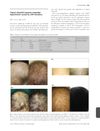TLDR LIPH mutations in Japan cause varying degrees of hair loss and woolly hair.
The study analyzed 14 unrelated Japanese families with autosomal recessive woolly hair/hypotrichosis (ARWH) and identified two prevalent LIPH mutations, c.736T>A and c.742C>A, as causative. Homozygous c.742C>A mutations were linked to severe hypotrichosis, while homozygous c.736T>A mutations resulted in milder forms. Screening of 819 healthy Japanese controls showed allele frequencies of 0.87% for c.736T>A and 0.16% for c.742C>A, with carrier rates of 1.7% and 0.32%, respectively. The study highlighted the importance of genetic screening for accurate diagnosis and suggested that mutation patterns might influence the severity of hypotrichosis in ARWH.
12 citations
,
March 2012 in “JEADV. Journal of the European Academy of Dermatology and Venereology/Journal of the European Academy of Dermatology and Venereology” A specific gene mutation in Japanese people can cause varying degrees of hair thinning in adulthood.
194 citations
,
November 2006 in “Science” A genetic mutation in the LIPH gene causes hair loss and growth defects.
 7 citations
,
March 2015 in “British Journal of Dermatology”
7 citations
,
March 2015 in “British Journal of Dermatology” Applying minoxidil can help improve hair growth in people with hair loss caused by LIPH gene mutations.
 1 citations
,
February 2013 in “InTech eBooks”
1 citations
,
February 2013 in “InTech eBooks” Genetic mutations cause various hair diseases, and whole genome sequencing may reveal more about these conditions.
 12 citations
,
July 2016 in “British journal of dermatology/British journal of dermatology, Supplement”
12 citations
,
July 2016 in “British journal of dermatology/British journal of dermatology, Supplement” Different hair fiber development might explain why hair loss severity varies in patients with a specific genetic mutation, and treatments that thicken hair could help.
 May 2025 in “Frontiers in Genetics”
May 2025 in “Frontiers in Genetics” A new genetic variant in the LIPH gene causes hair growth issues in a Chinese patient.
 May 2024 in “Frontiers in medicine”
May 2024 in “Frontiers in medicine” A genetic mutation in the LIPH gene causes tightly curled hair that stops growing in some Japanese individuals.




